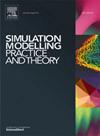MASS-GT: An empirical model for the simulation of freight policies
IF 3.5
2区 计算机科学
Q2 COMPUTER SCIENCE, INTERDISCIPLINARY APPLICATIONS
引用次数: 0
Abstract
Despite the importance of urban freight transportation for the accessibility and livability of cities, few systematic, quantitative and empirical methods exist which allow an impact assessment of urban freight transportation solutions or policies. There is a lack of transparent literature on the full specification and estimation of these models, which not only hampers continued research, but also the development of evidence-based urban freight transport policies. We present the urban freight simulator Multi-Agent Simulation System for Goods Transport (MASS-GT) with its full specification and empirical implementation for a study area in The Netherlands. It concerns an agent-based model based on a framework of discrete choice and optimization models, which describes logistic choices of shippers, carriers, producers and consumers. The disaggregate level of detail allows the analysis of a wide variety of logistic developments and policies across all or specific logistic segments. The model is estimated and validated using a variety of data sources: truck trip diaries, supply/use statistics, an e-commerce demand survey, traffic counts and other relevant statistics. The article presents the full specifications of the model and their empirical estimation, including the data sources used. Also, the validity of the model is evaluated using road freight traffic counts. Finally, examples of applications of the model to case studies are provided.
MASS-GT:货运政策模拟的经验模型
尽管城市货运对城市的可达性和宜居性具有重要意义,但很少有系统的、定量的和经验的方法可以对城市货运解决方案或政策进行影响评估。缺乏关于这些模型的完整规范和估计的透明文献,这不仅阻碍了继续研究,而且阻碍了基于证据的城市货运政策的发展。我们提出了城市货运模拟器货物运输多代理仿真系统(MASS-GT)及其完整的规范和经验实施在荷兰的一个研究区域。它涉及一个基于离散选择和优化模型框架的基于代理的模型,该模型描述了托运人、承运人、生产者和消费者的物流选择。详细的分解级别允许对所有或特定物流部分的各种物流发展和政策进行分析。该模型使用各种数据源进行估计和验证:卡车旅行日记、供应/使用统计、电子商务需求调查、交通计数和其他相关统计。本文介绍了该模型的全部规格及其经验估计,包括所使用的数据源。同时,利用道路货运量统计对模型的有效性进行了评价。最后,给出了模型在案例研究中的应用实例。
本文章由计算机程序翻译,如有差异,请以英文原文为准。
求助全文
约1分钟内获得全文
求助全文
来源期刊

Simulation Modelling Practice and Theory
工程技术-计算机:跨学科应用
CiteScore
9.80
自引率
4.80%
发文量
142
审稿时长
21 days
期刊介绍:
The journal Simulation Modelling Practice and Theory provides a forum for original, high-quality papers dealing with any aspect of systems simulation and modelling.
The journal aims at being a reference and a powerful tool to all those professionally active and/or interested in the methods and applications of simulation. Submitted papers will be peer reviewed and must significantly contribute to modelling and simulation in general or use modelling and simulation in application areas.
Paper submission is solicited on:
• theoretical aspects of modelling and simulation including formal modelling, model-checking, random number generators, sensitivity analysis, variance reduction techniques, experimental design, meta-modelling, methods and algorithms for validation and verification, selection and comparison procedures etc.;
• methodology and application of modelling and simulation in any area, including computer systems, networks, real-time and embedded systems, mobile and intelligent agents, manufacturing and transportation systems, management, engineering, biomedical engineering, economics, ecology and environment, education, transaction handling, etc.;
• simulation languages and environments including those, specific to distributed computing, grid computing, high performance computers or computer networks, etc.;
• distributed and real-time simulation, simulation interoperability;
• tools for high performance computing simulation, including dedicated architectures and parallel computing.
 求助内容:
求助内容: 应助结果提醒方式:
应助结果提醒方式:


